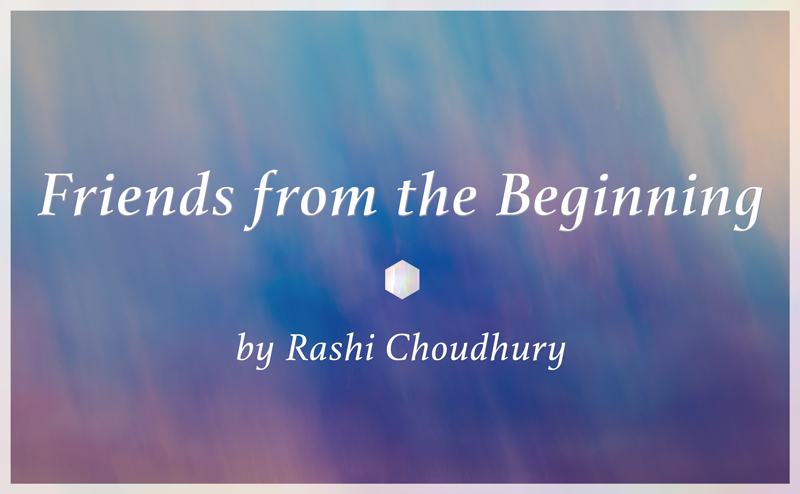Reflection on Gurumayi’s Message for 2019

In her Message talk this year, Gurumayi invited us to explore the possibility of a friendship between the mind and time. This teaching caught my attention, and I resolved to study it. It was completely unknown, uncharted territory for me, like an adventure!
My mind and time. Time and my mind. How could they be friends? I reflected on the qualities of friendship that exist in one of my most treasured relationships. For example, my friend and I have many things in common. We respect and are comfortable with each other.
The dictionary confirmed my understanding, saying, “A friend is a person with whom one has a bond of mutual affection; a person who you know well and whom you like a lot.”1 Reading this, I felt my heart expand. The thought of my mind and time sharing a bond of mutual affection was endearing.
Then I spent a few days poring over Siddha Yoga books and reflecting on Gurumayi’s words on the mind and time; as I did so, a deeper understanding of the integral relationship between them began to take shape.
In the issue of Darshan magazine titled Make the Mind Your Friend, Gurumayi says, “What is the mind? The mind is nothing but Consciousness, ultimate Reality.”2
In her book Resonate with Stillness, Gurumayi teaches, “Time is God.”3
The mind is Consciousness.
Time is God.
As Gurumayi’s words sank in, it was as if an inner mist cleared, and this understanding arose: the mind and time are friends because their relationship flows from their fundamental identity with the divine source, God or Consciousness. In fact, they have always been friends—from the very beginning!
As I reflected further, another insight emerged that had wonderfully practical implications for my sadhana: when I do things on time and in the time I’m supposed to, my mind is peaceful and content. Upon reflecting, I understood that I shouldn’t fritter away time or procrastinate. When it is time to do one thing, I shouldn’t do another.
During the next two days, I consciously focused on doing my tasks on time. I reminded myself: “My mind and time are friends,” and “This is my time to exercise, and that’s what I’ll do.” Or, “This is seva time; I’ll focus completely on seva.” As I started doing my tasks with the awareness of the friendship between the mind and time, I noticed that my mind relaxed and started to sink into silence. Thoughts were still flitting around, but the silence of the mind was much greater. Working from this space of silence made me feel as if there were no separate mind, time, me, or tasks. Everything was one. My mind and time were working with me, like friends, to complete all the tasks effortlessly. Deep respect arose within me for time and for my mind.
One Saturday in March this year, I had a particularly long list of things to do: responding to many emails, following my own sadhana and exercise plans, taking care of my sons, and offering home seva.
The previous night as I prepared to sleep, I had remembered my insight—when I do things on time and in the time I’m supposed to, my mind is peaceful and content. I thought about how I could put this insight into practice the next day. My first thought was to be firmer with myself regarding my morning routine. Sometimes I have turned off my alarm and snoozed for an extra ten minutes instead of getting up immediately for meditation. I decided—no more of that. I would get up as soon as the alarm went off, so that I would have a full hour for meditation.
The next morning, I found that saying this to myself the night before really helped me. It was as if my mind knew what had to be done and just guided me towards doing it. I sat for meditation, and in exactly an hour came out of meditation. Aha, I thought, when I respect time, it supports me!
Throughout that day, I kept remembering the insight I was practicing—I’ll do things on time and in the time I’m supposed to. I brought this focus to everything I did that day—making breakfast, answering emails, interacting with my sons, offering seva. I found my mind becoming silent and clear and moving with time.
Later when I looked back, I realized that my mind had been silent and serene the entire day. And because it was serene, it went from one activity to another without its usual retinue of thoughts about the “what” and “why” of each activity. My mind was not resisting time but flowing with it. At the end of the day, I felt peaceful and blessed.
I want to keep the insights I received from this exploration alive and part of my daily life. To do this, I have decided that every morning as I plan my day, I will remember that my mind and time are friends and that I must do my work in time. If I experience any restlessness or stress, it’s an indicator for me to check if I’m following the insights or not.
Because of this study of Gurumayi’s teachings, I have come to view both my mind and time as sacred instruments that support my journey in this world. My adventure—of discovering the eternal friendship between my mind and time—has granted me an invaluable gift, the gift of serenity.
- 1“Friend,” Oxford English Dictionary, https://en.oxforddictionaries.com/definition/friend.
- 2 Swami Chidvilasananda, “Befriending the Mind,” Darshan magazine, no. 108, Make the Mind Your Friend, p. 44.
- 3 Swami Muktananda and Swami Chidvilasananda, Resonate with Stillness: Daily Contemplations (South Fallsburg, NY: SYDA Foundation, 1995), September 24.


